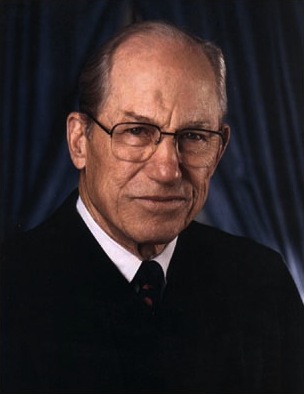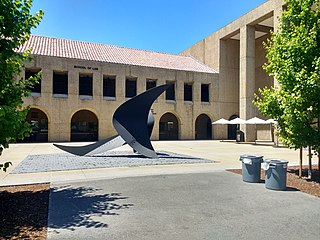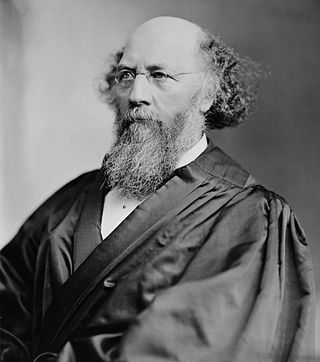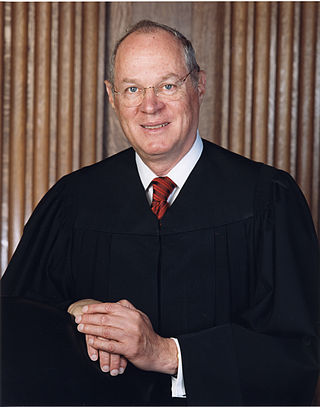Related Research Articles

Sandra Day O'Connor is an American retired attorney and politician who served as the first female associate justice of the Supreme Court of the United States from 1981 to 2006. She was both the first woman nominated and the first confirmed to the court. Nominated by President Ronald Reagan, she was considered a swing vote for the Rehnquist Court and the first five months of the Roberts Court.

Byron "Whizzer" Raymond White was an American lawyer, jurist, and professional football player who served as an associate justice of the Supreme Court of the United States from 1962 until 1993. By his retirement, he was its only sitting Democrat and the last surviving member of the progressive Warren Court.

Stanford Law School is the law school of Stanford University, a private research university near Palo Alto, California. Established in 1893, it is regarded as one of the most prestigious law schools in the world. Stanford Law has regularly ranked among the top three law schools in the United States by U.S. News & World Report since the magazine first published law school rankings in the 1980s, and has ranked second for most of the past decade. In 2021, Stanford Law had an acceptance rate of 6.28%, the second-lowest of any law school in the country. Since 2019, Jennifer Martínez has served as its dean.

Stephen Johnson Field was an American jurist. He was an Associate Justice of the United States Supreme Court from May 20, 1863, to December 1, 1897, the second longest tenure of any justice. Prior to this appointment, he was the fifth Chief Justice of California.
Golan v. Holder, 565 U.S. 302 (2012), was a Supreme Court case that dealt with copyright and the public domain. It held that the "limited time" language of the United States Constitution's Copyright Clause does not preclude the extension of copyright protections to works previously in the public domain.
Schenck v. Pro-Choice Network of Western New York, 519 U.S. 357 (1997), was a case heard before the United States Supreme Court related to legal protection of access to abortion. The question before the court was whether the First Amendment was violated by placing an injunction on protesters outside abortion clinics. The court ruled in a 6–3 decision that "floating buffer zones" preventing protesters approaching people entering or leaving the clinics were unconstitutional, though "fixed buffer zones" around the clinics themselves remained constitutional. The Court's upholding the fixed buffer was the most important aspect of the ruling, because it was a common feature of injunctions nationwide.
Brian Keith Reid is an American computer scientist. He developed an early use of a markup language in his 1980 doctoral dissertation. His other principal interest has been computer networking and the development of the Internet.

Robert Allen Stanford is an American financial fraudster, former financier, and sponsor of professional sports. He is serving a 110-year federal prison sentence, having been convicted in 2012 of fraud, on charges that his investment company was the vehicle for a massive Ponzi scheme.
Stanford v. Kentucky, 492 U.S. 361 (1989), was a United States Supreme Court case that sanctioned the imposition of the death penalty on offenders who were at least 16 years of age at the time of the crime. This decision came one year after Thompson v. Oklahoma, in which the Court had held that a 15-year-old offender could not be executed because to do so would constitute cruel and unusual punishment. In 2003, the Governor of Kentucky Paul E. Patton commuted the death sentence of Kevin Stanford, an action followed by the Supreme Court two years later in Roper v. Simmons overruling Stanford and holding that all juvenile offenders are exempt from the death penalty.
Capital punishment for juveniles in the United States existed until March 2, 2005, when the U.S. Supreme Court ruled it unconstitutional in Roper v. Simmons. Prior to Roper, there were 71 people on death row in the United States for crimes committed as juveniles.
Jeffrey L. Fisher is an American law professor and U.S. Supreme Court litigator who has argued thirty-nine cases and worked on dozens of others before the Supreme Court. He is co-director of the Stanford Law School Supreme Court Litigation Clinic.

William Hubbs Rehnquist was an American attorney and jurist who served on the U.S. Supreme Court for 33 years, first as an associate justice from 1972 to 1986 and then as the 16th chief justice from 1986 until his death in 2005. Considered a staunch conservative, Rehnquist favored a conception of federalism that emphasized the Tenth Amendment's reservation of powers to the states. Under this view of federalism, the Court, for the first time since the 1930s, struck down an act of Congress as exceeding its power under the Commerce Clause.
Zurcher v. Stanford Daily, 436 U.S. 547 (1978), is a United States Supreme Court case from 1978 in which The Stanford Daily, a student newspaper at Stanford University, was searched by police after they suspected the paper to be in possession of photographs of a demonstration that took place at the university's hospital in April 1971. The Stanford Daily filed a suit claiming that under the protection of the First and Fourth Amendments of the Constitution, the warrants were unconstitutional and that the searches should have fallen under the context of subpoenas. The Supreme Court ruled against The Stanford Daily; however, Congress later passed the Privacy Protection Act of 1980, which provides additional protections against searches and seizures to the press and individuals who disseminate information to the public, unless that individual is suspected of a crime or a life-threatening situation is present.
Massachusetts v. Mellon, 262 U.S. 447 (1923), was a United States Supreme Court case in which the Court rejected the concept of taxpayer standing. The case was consolidated with Frothingham v. Mellon. The plaintiffs in the cases, Frothingham and Massachusetts, sought to prevent certain federal government expenditures which they considered to violate the Tenth Amendment. The court rejected the suits on the basis that neither plaintiff suffered particularized harm, writing:
We have no power per se to review and annul acts of Congress on the ground that they are unconstitutional. The question may be considered only when the justification for some direct injury suffered or threatened, presenting a justiciable issue, is made to rest upon such an act. ... The party who invokes the power must be able to show not only that the statute is invalid but that he has sustained or is immediately in danger of sustaining some direct injury as the result of its enforcement, and not merely that he suffers in some indefinite way in common with people generally.

Anthony McLeod Kennedy is an American lawyer and jurist who served as an associate justice of the Supreme Court of the United States from 1988 until his retirement in 2018. He was nominated to the court in 1987 by President Ronald Reagan, and sworn in on February 18, 1988. After the retirement of Sandra Day O'Connor in 2006, he was considered the swing vote on many of the Roberts Court's 5–4 decisions.
Stanford University v. Roche Molecular Systems, Inc., 563 U.S. 776 (2011), was a United States Supreme Court case in which the Court held that title in a patented invention vests first in the inventor, even if the inventor is a researcher at a federally funded lab subject to the 1980 Bayh–Dole Act. The judges affirmed the common understanding of U.S. constitutional law that inventors originally own inventions they make, and contractual obligations to assign those rights to third parties are secondary.
Mexicali Rose v. Superior Court, 1 Cal. 4th 617 (1992), was a Supreme Court of California case in which the court’s decision held that restaurants, grocery stores, and other food service establishments in California can be held liable for injuries sustained by patrons from foreign objects—including natural food parts—that are left in food.
Betterman v. Montana, 578 U.S. 437 (2016), was a United States Supreme Court case which held that the right to a speedy trial does not guarantee the right to speedy sentencing. It was decided on May 19, 2016.
People v. Turner, formally The People of the State of California v. Brock Allen Turner (2015), is a high-profile criminal case in which Brock Allen Turner was convicted by jury trial of three counts of felony sexual assault.
The Court of Judicature and Revision, also known as the Court of Judicial Review, was a central government agency in several imperial Chinese. From the Chinese, the system was also studied and implemented by Vietnamese dynasties. It was generally in charge of reviewing judicial proceedings at all administrative levels and singling out the cases for a retrial by court officials or the emperor himself. In China, the office was created during the Northern Qi dynasty (550–577) and continued until the Qing dynasty (1636–1912). In Vietnam, it was adopted by Lê Thánh Tông in 1466, and continued until the Nguyễn dynasty.
References
- ↑ "Stanford ruling backs Antiguan receivers". Houston Chronicle. May 18, 2009. Retrieved 22 July 2013.